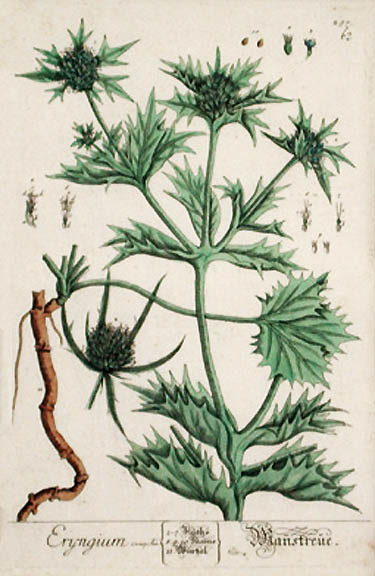| Title: |
Eryngium |
| Artist: |
Blackwell, Elizabeth (London, 1700-1759) |
| Date: |
c. 1755 |
| Medium: |
Original Hand - Coloured Engraving |
| Publisher: |
Jacob Trew, Nuremberg |
| Note: |
Elizabeth Blackwell: One of the most remarkable artists
of early botanical art, Elizabeth Blackwell (London, 1700- 1759), is said
to have become an artist in order to obtain funds to free her husband,
Dr. Alexander Blackwell, from debtors' prison. Hearing that a work upon
plants with medicinal qualities was needed, She made frequent trips to
the nearby Chelsea Physic Garden to observe and draw the plants. Elizabeth
compiled 'A Curious Herbal', with the support of Sir Hans Sloane and the
help of Philip Miller and others. She was also amongst the first botanical
artists to actually engrave her own designs rather than hiring a professional
engraver. Altogether, the undertaking took her six full years to complete
and in the end she was able to free her husband. Unfortunately, he went
to Sweden several years later and became involved in a political plot
and was eventually executed. |
| |
The first edition of Elizabeth Blackwell's art was published in London
in 1739 under the title of, 'A Curious Herbal'. "Eryngium" hails
from the much expanded second edition, published by Jacob
Trew in Nuremberg between 1750 and 1760 under the title of, 'Herbarium
Blackwellianum Emmendatum et Auctum'. Each engraving was hand-coloured
by botanical artists before publication. Besides the obvious beauty of
these original engravings, examples from the Herbarium have been cited
as perhaps the most important images of herbs and other medicinal plants
created during the eighteenth century. One can see from these antique
engravings why Elizabeth Blackwell has been called one of England's best
early botanical artists. |
| |
Dr. Christopher Jacob Trew: Dr. Christopher Jacob
Trew was a wealthy physician of Nuremberg who loved flowers and books
and proceded to combine his two interests in a series of magnificent
volumes. 'Herbarium Blackwellianum Emmendatum et Auctum' (between 1750
and 1760) dealt with herbals and medicinal plants. This original
Blackwell engraving depicting the "Eryngium" originates from the 'Herbarium
Blackwellianum Emmendatum et Auctum'. Another series was 'Plantae Selectae' ( 1750 - 1773) which
contained many subjects of botanical interest and the species chosen
were mainly for their rarity and novelty. The 'Hortus Nitidissimus'
(1750 - 1786) was unlike the previous works. It was one of the greates
florilegiums of the eighteenth century and was confined to ornamental
flowers. Its aim was to present some of the most magnificent flowers.
'Plantae Selectae' and 'Hortus Nitidissimus' were continued by other
editors long after Trew's death in 1769. |
| Edition: |
Second Expanded Edition. |
| Source: |
Herbarium Blackwellianum Emmendatum et Auctum |
| Size: |
11 1/2 X 7 1/2 (Sizes in inches are approximate,
height preceding width of plate-mark or image.) |
| |
Matted with 100% Archival Materials |
| Condition: |
Printed on watermarked, hand-made, eighteenth century paper
and with full margins as published in the Nuremberg edition around 1755.
Slight notations in the margin in eighteenth century pen exist else this original
engraving entitled, Eryngium is in excellent condition throughout with unfaded,
original hand colouring. This original engraving represents a prime,
original example of the 18th century botanical art by Elizabeth Blackwell. |
| Price: |
Sold - The price is no longer available. |
| Important Information: |
The artist biographies, research and or information pertaining to all the original works of art posted on our pages has been written and designed by Greg & Connie Peters exclusively for our site, (www.artoftheprint.com). Please visit us regularly to view the latest artworks offered for sale. We will soon be posting an update of our most recent research and include the biographical and historical information pertaining to our next collection of original works of art created by artists throughout the centuries. We hope you found the information you were looking for and that it has been beneficial.
Our Gallery, (Art of the Print / www.artoftheprint.com) guarantees the authenticity of every work of art we sell 100%. Full documentation and certification is provided. We offer a wide selection of international fine art dating from the early Renaissance to the contemporary art period. |



![]()
![]() or
phone Greg & Connie (905) 957-6666
or
phone Greg & Connie (905) 957-6666